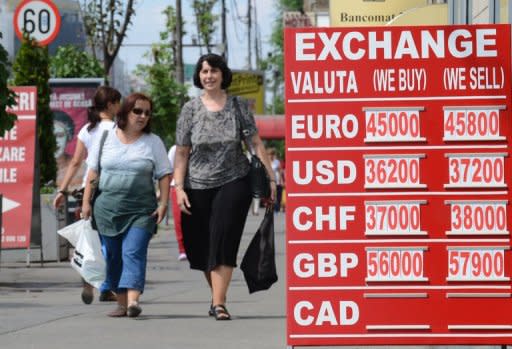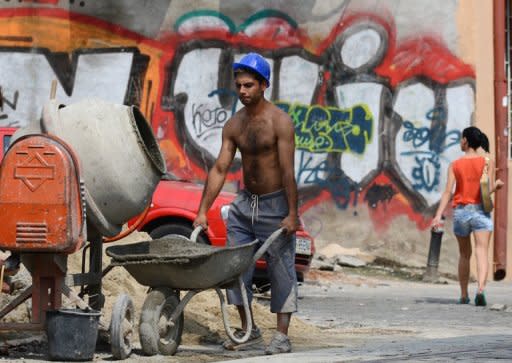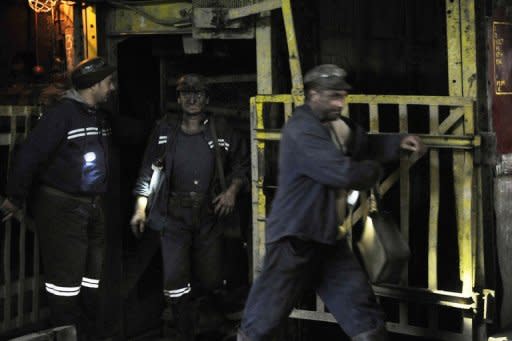Political turmoil cripples Romania's economy
The recovery in Romania's economy after two years of severe recession is now coming under threat, analysts warn, victim to the months-long political crisis that has engulfed the EU country. Prime Minister Victor Ponta told the International Monetary Fund this past week that his centre-left government was determined to continue cost-cutting reforms and stick to plans to sell stakes in major energy companies that underpin recovery plans. But analysts say that economic policy is "frozen", held hostage by the political war underway between the ruling Social-Liberal Union coalition and centre-right President Traian Basescu, targeted by an impeachment move launched six weeks ago. Romanians who cast ballots in a controversial referendum last month voted overwhelmingly for Basescu's removal, but its validity is being disputed and there have been allegations judges have been pressured and intimidated. "Stop the circus, try building something," urged recently the Ziarul Financiar daily, voicing the exasperation of the business community. "The economy is clogged, money is no longer changing hands, the public administration is blocked, major decisions are delayed and no important contracts are signed," economic analyst Doru Lionachescu of Capital Partners consulting firm told AFP. The first victim of the political row has been the local currency, the leu, which has lost nearly five percent of its value over the past few weeks. The depreciation will lead to hikes in the prices of fuel and of other imported goods. Romania emerged from two years of severe recession by posting 2.5 percent growth in 2011, but the economy has lost steam. It dipped into recession at the beginning of this year, and an expectations of a recovery are evaporating quickly. The forecast for growth this year has been cut from 1.5 to 1.0 percent, and a drought which has severely affected wheat and maize crops will hurt overall economic performance, analysts pointed out. While some of Romania's slowdown is a spillover from the troubles of its larger EU partners, the political gridlock threatens to aggravate the situation further. Faced with the endless squabbling, central bank governor Mugur Isarescu abandoned his courteous tone and came close to using a four-letter word in a public address, hoping this will draw the politicians' attention. "We depend on the international markets and they will punish us severely," Isarescu stressed. In this tense environment, investors have shown increased caution and capital flows have dried up. "The political crisis and the instability is has spurred could make some entrepreneurs delay their decisions to invest in Romania," a western diplomatic source said. "The question is how foreign companies that considered investing in Romania will react to the situation," said Annika Pattberg of Germany Trade and She added that foreign investors need political stability as well as a stable and transparent legal system. The IMF, which is conducting an assessment mission in Romania, voiced concern over the ongoing political disputes and urged the government to focus on economic reforms. "Over the last few years Romania has made progress in recovering from the financial crisis and the economy has made progress in stabilising inflation and the budget situation but the current turmoil has taken its toll on the economy," chief negotiator Erik de Vrijer said. Romania obtained a 20-billion-euro ($25-billion) rescue package from the IMF, the EU and the World Bank in May 2009, in exchange for drastic spending cuts. In March 2011, the IMF and the EU provided a fresh credit line of five billion euros to be drawn only in case of emergency. De Vrijer added that investor confidence and Romania's standing in financial markets have lately been undermined, while the cost of borrowing surged. "It is important for the government to focus on macroeconomic priorities, which means pushing ahead with sound budgetary policies and with reforms that will enable the economy to grow faster," he stressed. Financial analyst Aurelian Dochia deplored the government is too busy quarrelling with the president instead of taking steps to boost the economy. "Politicians don't realize how dramatic the situation is both in Romania and internationally," he said, stressing that the Balkan country's economy is closely linked to the eurozone, although it is not part of it. "The main thing we should have avoided was to dig our own grave. Unfortunately this is exactly what we are doing."




